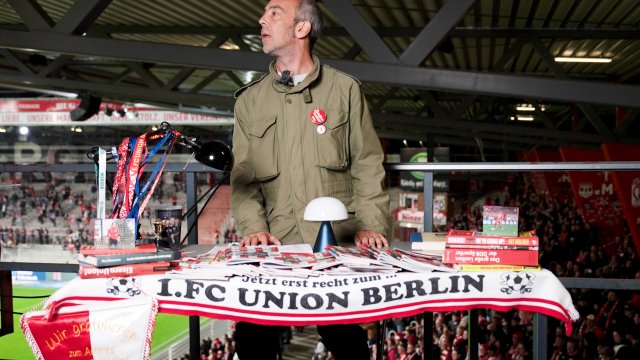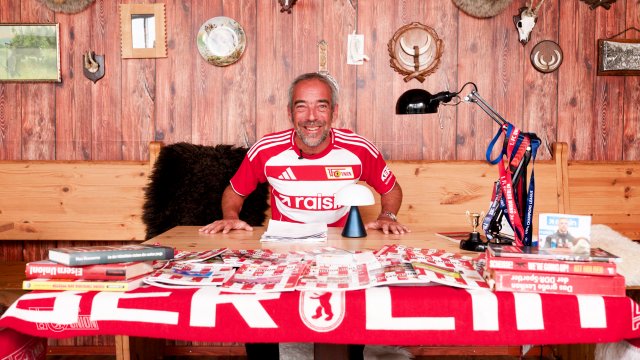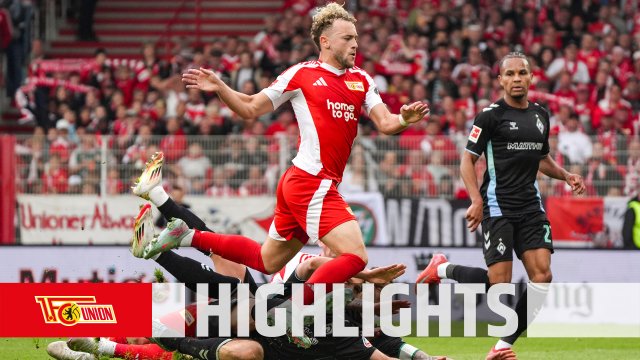

Youth
Opponents Confirmed for U19s and U17s:
Main Rounds of the DFB Youth Leagues Drawn

Men's Team
Friday Night Lights
Union Host Leipzig in the Last Home Game of the Year

Women's Team
Safe Hands Staying
Cara Bösl Signs a Contract Extension

Women's Team
Joint Press Release:
Foundation of the Women's Bundesliga FBL e.V.

Club

Fans
Half-Year Ticket for the Women’s Bundesliga:
Get Your Union Season Ticket Now!

Women's Team
3-0 Loss Belies Good Performance
Union's Women Lose in Hoffenheim

Men's Team
Nsoki's Deflected Shot a Consolation in Away Loss
Union Lose 3-1 in Wolfsburg

Men's Team
The Next Hurdle in Wolfsburg
Union on the Hunt for the Next Three Points

Women's Team
2025 Draws Slowly to a Close
Union's Women Travel to Hoffenheim

Women's Team
Coming Together for the Future
Top Flightclubs Establish Women's Bundesliga FBL e.V.

Club
Union Turn 60
Annual General Meeting on the Club's Anniversary

Men's Team
Pride Follows Dramatic 3-2 Loss
Union Narrowly Fall to Bayern in the Cup

Women's Team
Friendlies and Training Camps
Union's Women's Internationals

Men's Team
Round of 16 Tie Under the Lights
Union Look to Stop Bayern in the Cup
Official Fan Shop


- DUFTE
- Neuheiten
€24.95


- DUFTE
- Neuheiten
€69.95


- Neuheiten
€24.95


- Neuheiten
€14.95


- Neuheiten
€44.95


- Bestseller
- Neuheiten
€19.95


- Bestseller
- Neuheiten
€24.95

AFTV in English
1. FC Union Berlin Highlight Show | Episode 8

AFTV in English
Interview | Antonia Halverkamps

AFTV in English
1. FC Union Berlin Highlight Show | Episode 7

AFTV in English
Interview | Ida Heikkinen

AFTV in English
1. FC Union Berlin Highlight Show | Episode 6

AFTV in English
Interview | Oliver Burke

AFTV in English
1. FC Union Berlin Highlight Show | Episode 5

AFTV in English
1. FC Union Berlin Highlight Show | Episode 4

AFTV in English
1. FC Union Berlin Highlight Show | Episode 3

AFTV in English
Interview | Derrick Köhn | Sweetman in the Locker Room

AFTV in English
1. FC Union Berlin Highlight Show | Episode 2

AFTV in English
1. FC Union Berlin Highlight Show | Episode 1

AFTV in English
Post-match interviews | 1. FC Union Berlin - FSV Gütersloh 2009

1. FC Union BerlinEintracht Frankfurt
Stadion An der Alten Försterei
Women's Team

Nürnberg1. FC Union Berlin
Max-Morlock-Stadion
Women's Team

1. FC Köln1. FC Union Berlin
RheinEnergieSTADION
Men's Team

FC Erzgebirge Aue1. FC Union Berlin
Men's Team

1. FC Union Berlin1. FSV Mainz 05
Stadion An der Alten Försterei
Men's Team

FC Augsburg1. FC Union Berlin
WWK ARENA
Men's Team

VfB Stuttgart1. FC Union Berlin
MHPArena
Men's Team

1. FC Union BerlinBayer 04 Leverkusen
Stadion An der Alten Försterei
Women's Team

1. FC Union BerlinBorussia Dortmund
Stadion An der Alten Försterei
Men's Team

TSG Hoffenheim1. FC Union Berlin
PreZero Arena
Men's Team

SGS Essen1. FC Union Berlin
Stadion an der Hafenstraße
Women's Team

1. FC Union BerlinEintracht Frankfurt
Stadion An der Alten Försterei
Men's Team

1. FC Union BerlinCarl Zeiss Jena
TBC
Women's Team

Hamburger SV1. FC Union Berlin
Volksparkstadion
Men's Team

SC Freiburg1. FC Union Berlin
Dreisamstadion
Women's Team

1. FC Union BerlinBayer 04 Leverkusen
Stadion An der Alten Försterei
Men's Team

1. FC Union Berlin1. FC Köln
TBC
Women's Team

Borussia Mönchengladbach1. FC Union Berlin
BORUSSIA-PARK
Men's Team

1. FC Union BerlinSV Werder Bremen
Stadion An der Alten Försterei
Men's Team

RB Leipzig1. FC Union Berlin
TBC
Women's Team















